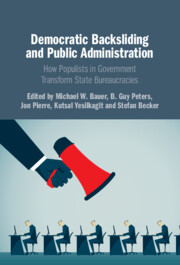 Democratic Backsliding and Public Administration
Democratic Backsliding and Public Administration Book contents
- Democratic Backsliding and Public Administration
- Democratic Backsliding and Public Administration
- Copyright page
- Contents
- Figures
- Tables
- Contributors
- Preface
- 1 Introduction: Populists, Democratic Backsliding, and Public Administration
- 2 Incomplete Democratization, System Transformation, and the Civil Service: A Case Study on the Weimar Republic and the Nazi Regime in Germany
- 3 Resilience Without Resistance: Public Administration Under Mutating Populisms in Office in Italy
- 4 Illiberal Transformation of Government Bureaucracy in a Fragile Democracy: The Case of Hungary
- 5 Public Administration in Poland in the Times of Populist Drift
- 6 Technocratic-Populist Mayors and Public Administration in Three European Cities
- 7 Populism and the Deep State: The Attack on Public Service Under Trump
- 8 “Doublespeak Populism” and Public Administration: The Case of Mexico
- 9 Venezuela: Sidelining Public Administration Under a Revolutionary-Populist Regime
- 10 Working, Shirking, and Sabotage in Times of Democratic Backsliding: An Experimental Study in Brazil
- 11 Public Administration: How to Respond to Populism and Democratic Backsliding
- 12 Conclusions: Public Administration Under the Rule of Democratic Backsliders
- References
- Index
7 - Populism and the Deep State: The Attack on Public Service Under Trump
Published online by Cambridge University Press: 17 August 2021
- Democratic Backsliding and Public Administration
- Democratic Backsliding and Public Administration
- Copyright page
- Contents
- Figures
- Tables
- Contributors
- Preface
- 1 Introduction: Populists, Democratic Backsliding, and Public Administration
- 2 Incomplete Democratization, System Transformation, and the Civil Service: A Case Study on the Weimar Republic and the Nazi Regime in Germany
- 3 Resilience Without Resistance: Public Administration Under Mutating Populisms in Office in Italy
- 4 Illiberal Transformation of Government Bureaucracy in a Fragile Democracy: The Case of Hungary
- 5 Public Administration in Poland in the Times of Populist Drift
- 6 Technocratic-Populist Mayors and Public Administration in Three European Cities
- 7 Populism and the Deep State: The Attack on Public Service Under Trump
- 8 “Doublespeak Populism” and Public Administration: The Case of Mexico
- 9 Venezuela: Sidelining Public Administration Under a Revolutionary-Populist Regime
- 10 Working, Shirking, and Sabotage in Times of Democratic Backsliding: An Experimental Study in Brazil
- 11 Public Administration: How to Respond to Populism and Democratic Backsliding
- 12 Conclusions: Public Administration Under the Rule of Democratic Backsliders
- References
- Index
Summary
This chapter addresses the ways in which the Trump administration has exemplified and accelerated a long-term trend toward democratic backsliding in the United States by undermining public sector institutions. The Trump administration has sidelined administrative expertise and scientists in many areas, selecting senior leaders whose lack of qualification is frequently matched only by their disdain for their organizational mission, and shown a willingness to push the boundaries of the law beyond its breaking point. While avoiding a direct attack on civil service legislation, the Trump administration has sought to weaken the ability of public sector unions to negotiate for benefits, punished individuals and units deemed not to be politically loyal, and weakened oversight bodies such as the Merit Systems Protection Board. All of this has been accompanied by a rhetoric of delegitimization, wherein the President and his supporters frequently invoke conspiratorial theories of deep state plots. These tendencies, and the costs that they raise, are illustrated both in President Trump’s impeachment process and a botched response to the coronavirus pandemic.
Keywords
Information
- Type
- Chapter
- Information
- Democratic Backsliding and Public AdministrationHow Populists in Government Transform State Bureaucracies, pp. 151 - 177Publisher: Cambridge University PressPrint publication year: 2021
Accessibility standard: Unknown
Why this information is here
This section outlines the accessibility features of this content - including support for screen readers, full keyboard navigation and high-contrast display options. This may not be relevant for you.Accessibility Information
- 20
- Cited by